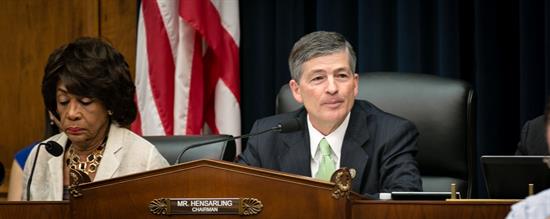Hensarling: Voice of the Taxpayer Must Be Heard in Flood Insurance Debate
Washington,
June 15, 2017
House Financial Services Committee Chairman Jeb Hensarling (R-TX) delivered the following opening statement today about the seven bills the committee is considering related to the National Flood Insurance Program: There are so many important voices in our debate today on the reauthorization of the National Flood Insurance Program. Certainly the homeowners who have relied on this program -- theirs is a very important voice because we go to their homes and we go to their household finances. Theirs is a very important voice. Homebuilders, they have an important voice. Insurance agents and companies, local communities -- these are all important voices in this debate. But as far as I’m concerned, perhaps the single-most important voice is the voice that remains underrepresented in the debate and that is the voice of the American taxpayer. The American taxpayer who has been called upon in the past to bail out a program that is currently drowning in $26 billion of red ink and suffers a $1.4 billion annual actuarial deficit. Maybe that’s why I heard from Kathy in Garland, Texas in my district who wrote: “It’s just another reason the average person in this country is going under financially. Far too many programs are being funded by the average American but very few receive any benefits from what they are funding.” In talking about the program, Steven of Larue in my district said: “This is just another instance of the federal government wasting the taxpayer dollars over and over and over again on the same problems. People that choose to live in flood-prone areas after receiving one payment benefit should be removed from the entirety of the program.” Just two taxpayer comments. So again, we know for a fact the program is in debt. We know for a fact the program is running an actual annual deficit. So it begs the question: Should there be a permanent taxpayer subsidy? I say no. It cannot be, not when I’m sitting here looking at a national debt clock that continues to run out of control before us, which I continue to believe is a far under-appreciated clear and present danger to our republic. Part of those numbers spinning out of control represent the National Flood Insurance Program. I don’t know if America will ever become a bankrupt society, but I know the face of bankruptcy is an ugly one. In Detroit, when it became bankrupt, thousands of street lights couldn’t afford to be replaced and ambulances did not run. Municipal retiree health care benefits were cut immediately. In Puerto Rico, hospitals had to lay off workers, ration medication, reduce services. In Greece, from 2008 to 2013 they became 40 percent poorer. Homelessness increased 25 percent in four years. I don’t think America would ever become Puerto Rico, Detroit or Greece, but I don’t know, and it’s not something in good conscience I can ignore. So I believe we need a National Flood Insurance Program that will make the program fiscally sustainable. I do believe that people should gradually – gradually – be expected to pay actuarial rates. They need predictability. We need to protect them from sticker shock, but the program must be made sustainable. I believe market competition is important and we have heard evidence that in many places where there has been even limited market competition we have actually seen premiums decreased. And the industry is poised to come in. It’s a very different world today than it was half a century ago when this program was launched. Better risk assessment tools, better financing mechanisms to spread the risk globally. And so this is a bill that, perhaps, it would take as long as 15 years to fully phase in some actuarial rates. We’re talking today about bills that, if enacted, would increase premiums about $2 a month to put this on the road toward actuarial soundness where all will be protected, no one will be denied a policy, all will benefit from competition and the NFIP will be sustainable and the national debt clock will spin a little less rapidly. With other important reforms of mapping, mitigation, claims processing protections and reforms, I commend all of the authors of the legislation that we will be marking up today and I look forward to the markup. |


